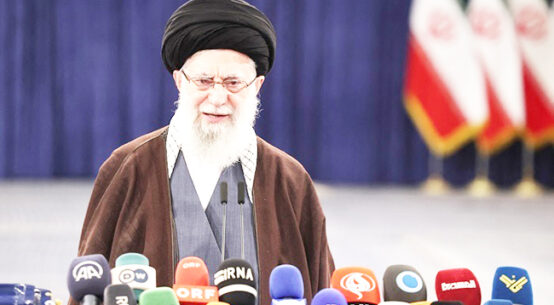US Defense Secretary Lloyd Austin told lawmakers Thursday that Israel had killed more than 25,000 Palestinian women and children since October, but the Pentagon later clarified he was citing the overall toll from Gaza’s Hamas-run health ministry.
“It’s over 25,000,” Austin responded when asked during a House Armed Services Committee hearing for the figure on women and children killed.
Hamas carried out an unprecedented attack on Israel on October 7 that resulted in the deaths of around 1,160 people, and Israel responded with a relentless assault on Gaza.
The United States has provided extensive backing for its ally, but Washington has recently been pushing for a ceasefire in Gaza and a reduction in civilian casualties.
Following Austin’s remarks, Deputy Pentagon Press Secretary Sabrina Singh said the secretary had been “citing an estimate from the Hamas-controlled health ministry that more than 25,000 total Palestinians have been killed in Gaza.”
“We cannot independently verify these Gaza casualty figures,” she added.
The health ministry put the toll at more than 25,000 killed in Gaza on January 21 — over a month ago — and said Thursday that more than 30,000 people have been left dead by the nearly five-month conflict in the coastal territory.
In 1967, following the Six-Day War fought between Israel and a coalition of Arab states (primarily Egypt, Syria, and Jordan), Israel occupied the Palestinian territories, including the Gaza Strip, which had formerly been occupied by Egypt. In 1987, the First Intifada, a popular uprising by the Palestinians against the Israeli occupation, began.
The conflict lasted five years and ended with the Oslo Accords, creating the Palestinian National Authority and dividing the West Bank into three administrative areas. Following the failure of the subsequent peace talks at the Camp David Summits in 2000, violence once again escalated during the Second Intifada, which ended with the Sharm el-Sheikh Summit and Israel’s military withdrawal from Gaza in 2005 and subsequent blockade.
Hamas, an Islamist militant group, won the 2006 Palestinian legislative election and a subsequent battle in the Gaza Strip between it and Fatah, which led to Hamas taking over governance of Gaza, and further escalating tensions with Israel. Israel, along with Egypt, imposed a blockade that significantly damaged Gaza’s economy, citing security concerns as the justification. International rights groups have characterized the blockade as a form of collective punishment, while Israel defended it as necessary to prevent weapons and dual-use goods from entering the territory.
Since the blockade, Israel and Palestinian militants have had several clashes and made attacks on each other. The Palestinian Authority has not held national elections since 2006. Hamas tunneled under the border wall to launch cross-border attacks and fired rockets into Israeli territory. This led to multiple conflicts, escalating into outright wars. Israel relied on the Iron Dome rocket defense system for defense, and responded with targeted strikes into Gaza, aiming to minimize the militant threat. Surveys in 2023 of Palestinians in Gaza and the West Bank before the war indicated that a majority supported the use of “armed struggle”, the creation of “militant groups”, and an intifada (“uprising”) against the Israeli occupation.
The Gaza Strip’s economy declined greatly due to the blockade, with a 30% drop in real Gross Domestic Product (GDP) within a year. By 2015, the unemployment rate had risen to 45% (compared to the pre-blockade level of 10%).In 2023, UNRWA statistics for Gaza reported 81% of people living below the poverty level, and 63% being food insecure and dependent on international assistance.according to UNICEF, “Israel only approves 64%” of patients’ requests to leave Gaza for specialized medical treatment.
According to an analysis in The Independent, the Gaza blockade created hopelessness among Palestinians, which was exploited by Hamas, convincing young Palestinian men that violence was their only solution. Daoud Kuttab wrote that Palestinian attempts to solve the conflict via negotiations or non-violent boycotts have been fruitless.
Hamas is designated as a terrorist organization by a number of states and regional blocs, including the United States, the United Kingdom, Japan, Australia and the European Union. Other UNSC permanent members including China and Russia do not regard Hamas as a terrorist organization. A 2018 attempt to condemn Hamas for “acts of terror” at the United Nations failed to achieve the required two-thirds majority, with 87 votes in favor, 58 votes against, 32 abstentions and 16 non-votes. The UN Israeli Ambassador at the time criticized the procedure, stating the vote had been “hijacked” due to a change in procedure requiring a two-thirds majority instead of a simple majority which would have passed the motion.
In February–March 2021, Fatah and Hamas reached agreement to jointly conduct elections for a new Palestinian legislative assembly, in accordance with the Oslo Accords. Hamas committed to upholding international law, transferring control of Gaza to the Palestinian Authority and to allowing it to negotiate with Israel to establish a Palestinian state along the 1967 ceasefire lines, with East Jerusalem as its capital. According to Menachem Klein, Israeli Arabist and political scientist at Bar-Ilan University, Mahmoud Abbas subsequently cancelled the elections under pressure from Israel and the United States. Soon after the 2021 Israel–Palestine crisis exploded, the Al-Qassam Brigades started planning the operation which would break out on 7 October 2023.

